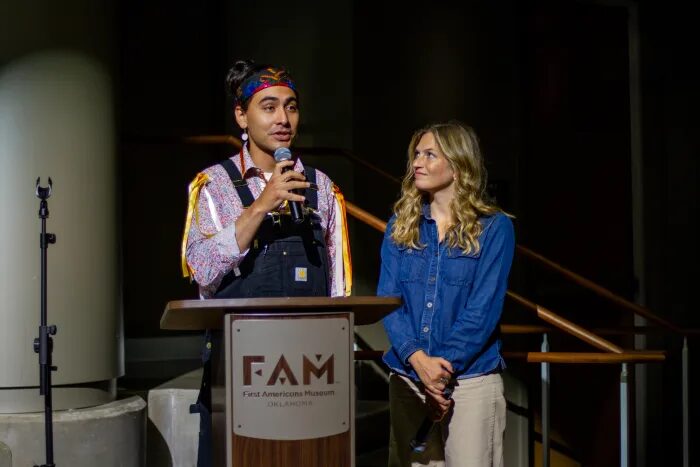The billboard project is expanding to Oregon
Film shines light on search for student graves
First leg of the ‘Sugarcane’ film Rez Tour ends in the Black Hills

Julian Brave NoiseCat and his father Ed Archie NoiseCat look down at the Williams Lake Stampede from the top of “Indian Hill” on their roadtrip back to St. Joseph’s Mission, where Ed was born. (Credit: Emily Kassie/Sugarcane Film LLC)
After taking home the U.S. Directing Award from the 2024 Sundance Film Festival, “Sugarcane” co-directors Julian Brave NoiseCat and Emily Kassie are touring Indian Country and hosting showings.
“We thought it was important to get the film to the community for whom the story really belongs,” Kassie said. “The idea of the Rez Tour is to bring it to those places and give Native communities an opportunity to present the film in a way that felt good to them.”

Work on “Sugarcane” began for the filmmakers three years ago when Canadian journalists NoiseCat and Kassie set out to make a documentary following the 2021 push in Canada to identify unmarked graves at residential schools.
Kassie went looking for a school to focus on and found the Sugarcane/Williams Lake 1 Reserve, where tribal leaders were about to start their own search at the St. Joseph’s Indian Mission School. She called Willie Sellars, chief of the Williams Lake First Nation, and formed a plan to document the upcoming search. After that, Kassie called NoiseCat and filled him in.
For NoiseCat, the topic in general was personal. Even more so, Kassie had unknowingly chosen to focus on the school where NoiseCat’s grandmother had been sent and where his father was secretly born.
The decision to work on “Sugarcane” wasn’t one that NoiseCat made lightly, and his role adapted over time. Eventually, he took on a starring role in the film as it navigated and focused on his family’s story.
“It’s not something that I took lightly,” NoiseCat said. “The first year of filming we filmed almost nothing from my narrative because I wasn’t sure I was ready or that my family was ready. I wasn’t sure that I wanted to do it. It was incredibly challenging and remains incredibly challenging.”
At times filming and working on the documentary felt very raw, NoiseCat said, but it also helped him to heal.
“I think that through this documentary my family and our family had the opportunity to find answers to questions that we always wanted to ask,” he said. “We also got to heal in really deep meaningful ways. It was a leap of faith and I’m really glad I took that leap because it has been one of the most meaningful parts of my life.”
Set amidst the search for unmarked graves, “Sugarcane” shines a light on the resilience of Native communities in breaking cycles of trauma caused by boarding schools and finding the strength to persevere.
“I think the story of people having the courage to talk about this history is not just my story, it’s the story of Native families all across North America,” NoiseCat said. “It’s our hope with this Rez Tour that families like mine and people like me will be encouraged to take that step and talk about something really difficult – an experience for many that was unspeakably awful.”
Kassie and NoiseCat said they hope the film helps people understand and recognize how the effects of colonization and intergenerational trauma manifest in Native communities today.
“Native communities across North America suffer from the highest rates of addiction, overdose and suicide,” Kassie said. “That is directly connected to a system that took away children from their families for over four generations … and didn’t allow them to know what it was like to parent or be parented and introduced cycles of horrific violence, physical, sexual and mental, into their lives for over 100 years.”
On Sept. 7, “Sugarcane” will make its way to Rapid City closing out the first leg of the Rez Tour. Previously, filmmakers stopped in Sitka and Anchorage, Alaska, Fort Yates, N.D., and Eagle Butte, S.D. While the 3 p.m. CST showing at the Golden Ticket Theater is sold out, directors said there is a waitlist available and following the screening, NDN Collective is hosting a Q&A and reception at its headquarters on Knollwood Drive.
While the Rapid City show is the final stop of the first leg of the Rez Tour, more dates and locations will be announced. “Sugarcane” also will be available for streaming on Disney Plus and Hulu in the late fall after its theatrical release.
External
Identification not yet made
UTTC International Powwow attendees share their rules for a fun and considerate event
Radio collaboration highlights importance of cooperation in a season of funding cuts for local media
A memorial in the Snow County Prison, now the United Tribes Technical College campus
Standing Rock Sioux Tribal Chairwoman Janet Alkire tells crowd, ‘We’re going to rely on each other’






